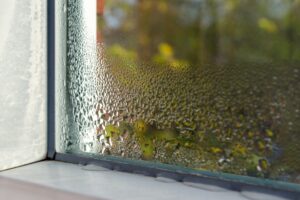Your air conditioner helps pull debris, dust, and dander from the air, but it brings something else along with it. Your air conditioner does, in fact, reduce the humidity in your home, but by how much? Is it enough, or do you need an additional solution?
It’s not a black-and-white answer. Many homes benefit from a central air conditioner combined with a whole house dehumidifier, but it’s a matter of location and average humidity. You don’t want the air to be too dry, either.
So does AC reduce humidity? Yes. Now let’s find out how much, and what you can do to make it even better.
First, Let’s Understand What Humidity Does to Your Home
You may think of humidity as the culprit for stuffy air and discomfort, and while that is true, it does far more than that. It can actually pose a threat to your health.
When your home’s RH (relative humidity) levels reach over 60%, you enter a zone where humidity leads to mold and mildew growth. This can take place on curtains, windowsills, carpets, and just about anywhere in your home.
Your air conditioner helps keep those levels down. Extremely warm and humid climates may still require a whole-house dehumidifier, but if your air conditioner can reduce the RH levels in your home to 50%, you’ll be okay.
Not All Air Conditioners Are Created Equal
Central air conditioners come from multiple manufacturers with different sizes and power requirements. Simply having an air conditioner isn’t enough to say “Hey, this will bring down my house’s humidity.”
This is why it’s important to have a pre-installation appointment when you know that you want a new air conditioning system. This is where a technician sizes the unit based on your home’s needs and square footage.
An AC that’s not powerful enough to cool your home in 15–20 minutes per cycle means that it not only runs longer and encounters problems, but you’ll be battling humidity all the time.
Cooler Doesn’t Always Mean Better
It’s a good idea to find a nice, stable temperature to keep your AC at. While turning it lower forces the air conditioner to run more and pull in more air, it isn’t necessarily better for keeping your RH levels down.
In fact, keeping your air conditioner too low can cause your evaporator coil to freeze, resulting in worse airflow and less humidity control. Find a comfortable temperature and stick with it. This will also help with predictability so you can always know what RH and temperature your home will be.
Air Conditioners Improve Your Air Quality
Beyond the temperature change, air conditioners also reduce humidity in the air and help prevent the spread of mold. It’s important to consider the possibility of adding a dehumidifier to your home in the future depending on your relative humidity levels, but in the meantime, an AC should do the trick.
Contact Bartels Heating & Cooling today to schedule your air conditioner installation, repair, or maintenance as soon as possible.

